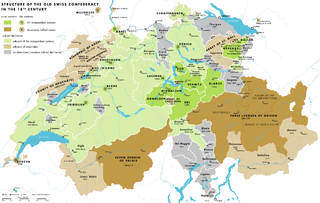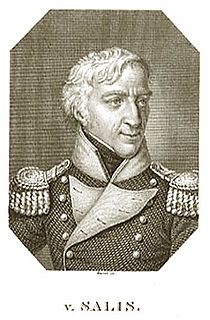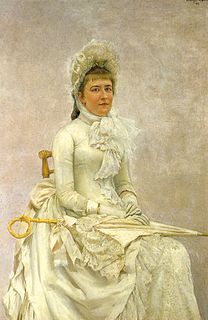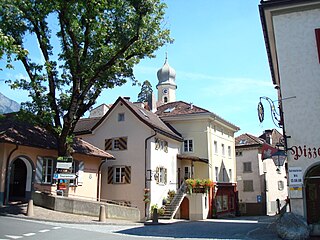
The early modern history of the Old Swiss Confederacy and its constituent Thirteen Cantons encompasses the time of the Thirty Years' War (1618–1648) until the French invasion of 1798.

The University of Bern is a university in the Swiss capital of Bern and was founded in 1834. It is regulated and financed by the Canton of Bern. It is a comprehensive university offering a broad choice of courses and programs in eight faculties and some 150 institutes. With around 17,904 students, the University of Bern is the third biggest University in Switzerland.

John Francis William de Salis, 6th Count de Salis was a British diplomat, and coin connoisseur.

Johann Gaudenz Gubert Graf von Salis-Seewis was a Swiss poet.
De Salis is a surname. Notable persons with that name include:
Katharina von Salis Perch-Nielsen is a Swiss geologist and orienteering competitor.

Anna Waser was a Swiss painter.

Friederike Brun, née Münther, was a Danish author and salonist.

Emilie Kempin-Spyri was the first woman in Switzerland to graduate with a law degree and to be accepted as an academic lecturer. However, as a woman she was not permitted to practice as an attorney; therefore she emigrated to New York, where she taught at a law school she established for women. Emilie Kempin-Spyri was the niece of the author Johanna Spyri.

Barbara Margaretha "Meta" von Salis was a Swiss feminist and historian, as well as a regular correspondent of Friedrich Nietzsche.
Regula Stämpfli is a Swiss born political scientist based in Brussels.
Gabrielle Oberhänsli-Widmer, is Professor of Jewish studies at the University of Freiburg.

Maria Gugelberg von Moos (1836–1918) was a renowned Swiss botanist and floral artist. Growing up amidst the natural beauty surrounding Salenegg Castle, she developed an early interest in natural history, and later botany. She studied botany extensively in middle age, systematically collecting and studying plants.

Marianne Ehrmann was one of the first women novelists, publicists and journalists in the German-speaking countries.

Lydia Welti Escher, was a Swiss patron of the arts and the daughter of Augusta Escher-Uebel (1838–1864) and Alfred Escher (1819–1882), among others the founder of the Gotthardbahn. Lydia Escher was one of the richest women of Switzerland in the 19th century, patron of the arts and established the Gottfried Keller Foundation.

An election for all seven members of the Federal Council, the government of Switzerland, was held on 9 December 2015, following the federal election on 19 October 2015.
Clara Willdenow was one of the first German women to attain a medical degree, though because she was denied study in her own country, she earned her degree in Switzerland. Opening a private gynaecology clinic, she operated it for more than two decades. Willdenow was openly lesbian and did not attempt to hide her orientation.
Maria Eichhorn is a German artist based in Berlin. She is best known for site-specific works and installations that investigate political and economic systems, often revealing their intrinsic absurdity or the extent to which we normalize their complex codes and networks.



















